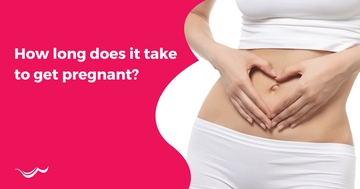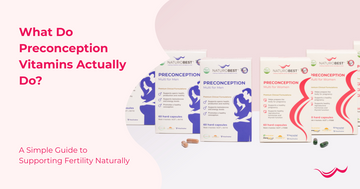How Long Does It Take to Get Pregnant? Understanding the Conception Timeline
by NaturoBest Naturopath Team on Feb 17, 2025

If you’re trying to conceive, one of the most common questions you may have is, “How long does it take to get pregnant?”
While the timeline varies for each individual, understanding fertility, ovulation, and factors that influence conception can help set realistic expectations and reduce anxiety.
The Average Timeline for Conception
For couples actively trying to conceive:
-
30% conceive within the first cycle (one month).
-
60% conceive within three months.
-
80% conceive within six months.
-
85-90% conceive within 12 months.
-
10-15% may experience difficulties and require fertility support.
If you’ve been trying for more than a year without success (or six months if you’re over 35), seeking professional guidance from a fertility specialist is recommended.
Key Factors That Influence Conception
Conception depends on several factors, including the timing of ovulation, reproductive health, and lifestyle habits. Here’s what you need to consider:
1. Ovulation Timing and Frequency of Intercourse
-
The fertile window occurs in the five days leading up to ovulation and the day of ovulation itself.
-
The highest chance of conception is when intercourse occurs one to two days before ovulation.
-
Using ovulation predictor kits (OPKs), tracking cervical mucus, and basal body temperature (BBT) can help pinpoint ovulation more accurately.
2. Age and Fertility
-
Female fertility peaks in the early to mid-20s and gradually declines after 30, with a more significant decrease after 35.
-
By age 40, the chance of conceiving naturally per cycle is approximately 5% compared to 20-25% in younger women.
-
Male fertility also declines with age, affecting sperm motility and DNA integrity.
3. Sperm and Egg Health
-
Sperm must be healthy in terms of count, motility, and morphology for successful fertilisation.
-
Egg quality declines with age but can be supported through a nutrient-rich diet, antioxidants, and preconception supplementation.
-
Ensuring a balanced lifestyle, avoiding toxins, and taking essential vitamins like folate, CoQ10, and omega-3s can improve egg and sperm health.
4. Underlying Health Conditions
-
Conditions such as PCOS, endometriosis, thyroid disorders, and autoimmune diseases can impact fertility.
-
Unexplained infertility accounts for 10-15% of cases, and further testing may be required.
-
A comprehensive fertility check-up can help identify any underlying issues early.
5. Lifestyle and Environmental Factors
-
Smoking, alcohol, high caffeine intake, and exposure to endocrine-disrupting chemicals can negatively impact fertility.
-
Managing stress, maintaining a healthy weight, and engaging in moderate exercise support reproductive health.
-
A high-quality preconception supplement provides essential nutrients for optimal fertility.
When to Seek Fertility Support
If conception is taking longer than expected, consider the following guidelines:
-
Under 35: Seek help after 12 months of trying.
-
35-40: Seek help after six months of trying.
-
Over 40: Consider fertility evaluation after three months.
A fertility specialist may recommend:
-
Hormonal testing to assess ovulation and reproductive hormone levels.
-
Ultrasounds or scans to check ovarian reserve and uterine health.
-
Semen analysis to evaluate sperm quality.
-
Lifestyle and dietary changes to enhance fertility potential.
A Hopeful Perspective on Conception
While the journey to pregnancy can take time, the majority of couples conceive within a year of trying. By understanding your cycle, adopting a healthy lifestyle, and seeking medical support when necessary, you can increase your chances of a successful pregnancy.
Your Conception Checklist:
✅ Track ovulation and identify your fertile window.
✅ Maintain a nutrient-rich diet and take preconception supplements.
✅ Engage in regular but moderate exercise.
✅ Manage stress and prioritise sleep.
✅ Limit alcohol, caffeine, and avoid smoking.
✅ Seek medical advice if conception takes longer than expected.
Every fertility journey is unique, but taking proactive steps can make all the difference. If you’re feeling uncertain or overwhelmed, remember that support is available from fertility specialists, naturopaths, and trusted healthcare professionals. Your path to parenthood is a journey—stay hopeful, informed, and empowered along the way.




